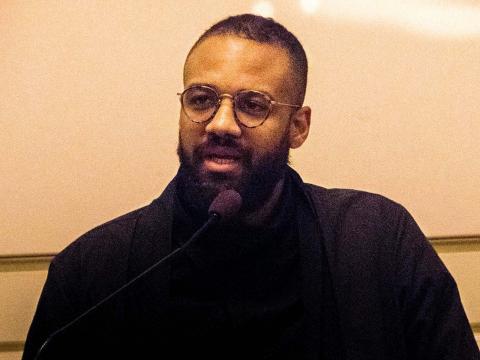Celebrating Professorial and Intellectual Diversity in Higher Education

A discussion with Vassar Assistant Professor of English Dorothy Kim (far left) in the VCAM building during the 2017 Mid-Atlantic Regional Conference of the Mellon Mays Undergraduate Fellowship. Photo by Holden Blanco '17.
Details
At the 2017 Mid-Atlantic Regional Conference for the Mellon Mays Undergraduate Fellowship Program, fellows and coordinators from local MMUF institutions visited Haverford for two days of discipline-spanning workshops, presentations, and discussions related to diversifying the academy.
“What does it mean to diversify [a] curriculum?” asked Dean of Diversity, Access and Community Engagement and Director of the Office of Multicultural Affairs Theresa Tensuan to the gathered crowd at the recent 2017 Mid-Atlantic Regional Conference for the Mellon Mays Undergraduate Fellowship Program (MMUF). Those in attendance were positioned best to know the answer—or at least have some ideas—as the MMUF seeks to diversify the faculty in higher education by providing mentorship and financial support to academically promising students from underrepresented minority groups who seek to pursue academic careers. It supports fellows on 48 campuses and consortia across the United States and South Africa, including at Haverford, where the program is coordinated by Tensuan and Associate Professor of English Maud McInerney.
On Nov. 10–11, current undergraduate fellows and coordinators from Bryn Mawr College, Cornell University, Haverford College, Princeton University, Swarthmore College, and the University of Pennsylvania gathered at Haverford to workshop works-in-progress, present new research, and discuss the challenges and opportunities of a career in the professoriate and life in the academy.
The MMUF program helps prepare fellows to enter Ph.D. programs by underwriting time for research and writing, connecting students with faculty mentors, and creating opportunities such as these annual conferences to help fellows build support networks across schools, gain experience presenting their own research, and learn from the projects and perspectives of others.
The 2017 Regional MMUF Conference started with a Friday night dinner with Haverford College President Kim Benston, and Saturday featured a full day of discussions on a variety of areas of expertise and subfields. These sessions, group by related theme and defined by presentations on the individual research of each fellow, involved discussion on a variety subjects such as “Politics, Philosophy, and Praxis,” “Black Women and Literature,” and “The Universe Around Us.”
Haverford MMUF fellow Seanna Viechweg ’19 presented “A Subversive Reading of Phyllis Wheatley’s To The University of Cambridge.” Viechweg, whose focus is in Caribbean literature—specifically narratives of immigration, kinship, and trauma— is interested in researching and teaching texts about marginalized groups of people, to, in her words, “broaden what is considered the English canon.”
Eight Haverford fellows presented at the conference on topics related to English literature, visual studies, history, and politics. The 31 other student presenters’ fields included health studies, sociology, media, linguistics, and even astronomy.
Haverford College has been an MMUF member institution for the past 15 years. Each spring, sophomores at the College are invited to apply for the fellowship, specifically those whose intellectual projects are expanding the foundation and breadth of knowledge.
Tensuan described how Haverford’s MMUF program coordinators are focusing their efforts on this campus to create a context for students who are working to “expand what we think of as our body of knowledge.” This effort is materialized through monthly reflections on the research that each fellow undertakes as part of the program.
The program has changed “how I see myself as a writer, and as a scholar,” said Maurice Rippel ’19, who presented his research on Black identity formation at the conference, noting that MMUF has helped “take a more critical lens to my work and ask better questions.”

So, how do we diversify a curriculum? Part of it is diversifying those who create that curriculum, which is the point of the MMUF program.
“It matters who is represented on a faculty, a college staff, and a student body,” said Haverford Assistant Professor of Religion and Africana Studies Terrance Wiley, who gave the conference’s keynote address. “And so in many respects MMUF's promise rests in how it creates a vibrant intellectual community among undergraduates and positions fellows to pursue postbac positions in academia and so impact how these institutions are constituted, whether it be in terms of which research questions are privileged or which programs are established.”
Wiley’s talk encouraged the fellows to imprint upon the institutions they attend and eventually work at, making them more fair and just than when they arrived. “For students of color this is doubly important, as a way to honor the work and legacies of those who sacrificed so much to improve the institutional spaces that we now move through,” he said. “We owe something to the ancestors, ourselves, our contemporaries, and any coming generations. The price of the ticket of freedom, equality, justice has not been paid and probably cannot be paid, and yet we cannot stop trying to pay it.”



